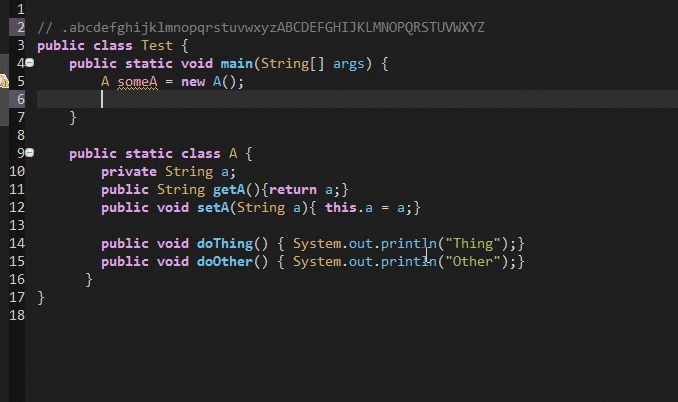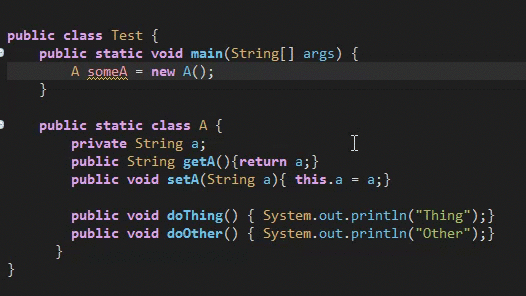Tips and Tricks for making Eclipse more Productive
By default, content assist is set to trigger on '.'. So if you have a basic class:
public class A {
private String a;
public String getA(){return a;}
public void setA(String a){ this.a = a;}
public void doThing() { System.out.println("Thing");}
public void doOther() { System.out.println("Other");}
}Then you have an instance of that class elsewhere:
A someA = new A();If you type the following, you should get some content assist for the relevant methods:
someA.This is cool - but wouldn't it be better if we could get content assist that felt more... intelligent? Well, the great news is that we can! Under Windows --> Preferences --> Java --> Editor --> Content Assist
They key parts are:
Auto activation delay and Auto activiation triggers for Java.
Changing the delay to 1 ms and the triggers to '.abcdefghijklmnopqrstuvwxyzABCDEFGHIJKLMNOPQRSTUVWXYZ' results in some really cool features.
If I now have:
soContent assist will offer some sugestions - like someA. If it's the only suggestion, typing "." will auto-complete the variable for us - neat!
This now enables us to have some really cool camel-case completion of methods as well. Typing:
someA.dTThe suggestion doThing will automatically appear. Typing ';' will then autocomplete that line. Awesome.
Normally, you'd be working away, and need to do something like, compare Strings, ignoring case, such as:
String str1 = "A";
String str2 = "a";
StringUtils.equalsIgnoreCase(str1, str2);Simple enough - but what if you'd forgotten the name of the library with the equalsIgnoreCase method? Or worse yet, what if there were multple StringUtils....
Favourites are a nifty feature which make it easier to use your favourite libraries, like StringUtils. It can be found under: Window --> Preferences --> Java --> Editor --> Content Assist --> Favourites
From the side, you can add your own Types to the list, by clicking New Type.... In this example, we'll add the ever favourite StringUtils.
With this in the list, the next time you need to equalsIgnoreCase, you can simply begin typing, and it will be presented as an option. When you select it, it will be added as a static import if it's not already present. Awesome!
Templates provide a quick and powerful way to get rid of a lot of the annoying boilerplate that you need to write. One of the most basic examples, is when you need to write a basic test stub.
import org.junit.Test;
// Heap of stuff..
@Test
public void testName() {
}What a pain! Fortunately, we can get around at least part of the pain, and reduce hte number of keypresses to around 2.
Let's create a template. Open up Window --> Preferences --> Java -> Editor --> Templates
We'll create a new template to stub this out for us.
@${testType:newType(org.junit.Test)}
public void ${testName}() {
${staticImport:importStatic('org.junit.Assert.*')}${cursor}
}Now, when we add this template with the name "tt", like:
We'll get a nice autocomplete for the Test:









